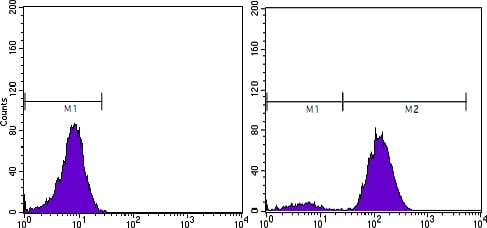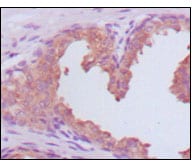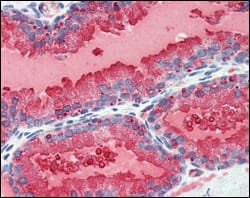


| WB | 1/500-1/2000 | Human,Mouse,Rat |
| IF | 咨询技术 | Human,Mouse,Rat |
| IHC | 1/30-1/150 | Human,Mouse,Rat |
| ICC | 技术咨询 | Human,Mouse,Rat |
| FCM | 咨询技术 | Human,Mouse,Rat |
| Elisa | 1/5000-1/10000 | Human,Mouse,Rat |
| Aliases | APS; PSA; hK3; KLK2A1; KLK3 |
| Entrez GeneID | 354 |
| clone | 5A11E2 |
| Host/Isotype | Mouse IgG1 |
| Antibody Type | Primary antibody |
| Storage | Store at 4°C short term. Aliquot and store at -20°C long term. Avoid freeze/thaw cycles. |
| Species Reactivity | Human |
| Immunogen | Purified recombinant fragment of KLK3 (aa26-251) expressed in E. Coli. |
| Formulation | Purified antibody in PBS with 0.05% sodium azide. |
+ +
以下是关于FABP4抗体的3篇参考文献,涵盖不同研究领域:
1. **文献名称**:*"Fatty acid-binding protein 4 (FABP4) regulates amyloid-β formation via β-secretase (BACE1) modulation*"
**作者**:Matsumata, M., et al.
**摘要**:本研究利用FABP4抗体探究其在阿尔茨海默病中的作用,发现FABP4通过调节BACE1活性促进淀粉样蛋白β生成,提示其作为神经退行性疾病的潜在治疗靶点。
2. **文献名称**:*"FABP4 inhibition suppresses proliferation and invasion of bladder cancer cells via the AMPK pathway*"
**作者**:Zhang, Y., et al.
**摘要**:通过FABP4抗体阻断实验,作者证实抑制FABP4可通过激活AMPK通路抑制膀胱癌细胞增殖和侵袭,为癌症治疗提供新策略。
3. **文献名称**:*"Adipocyte fatty acid-binding protein (FABP4) contributes to metabolic inflammation in adipose tissue*"
**作者**:Xu, A., et al.
**摘要**:研究使用FABP4抗体检测肥胖小鼠脂肪组织中的蛋白表达,发现FABP4通过促进巨噬细胞浸润加剧代谢性炎症,与胰岛素抵抗密切相关。
4. **文献名称**:*"FABP4 as a biomarker for cardiovascular risk in type 2 diabetes*"
**作者**:Tso, A.W.K., et al.
**摘要**:该临床研究利用FABP4抗体检测患者血清水平,发现其与2型糖尿病患者心血管事件风险显著相关,提示其作为预后标志物的潜力。
以上文献均通过FABP4抗体探索其在不同疾病中的分子机制,涉及神经退行性疾病、癌症、代谢综合征及心血管疾病等领域。
Fatty Acid-Binding Protein 4 (FABP4), also known as adipocyte FABP (A-FABP) or aP2. is a lipid chaperone protein primarily expressed in adipocytes and macrophages. It plays a critical role in regulating fatty acid uptake, transport, and intracellular metabolism by binding hydrophobic ligands such as long-chain fatty acids. FABP4 is implicated in metabolic and inflammatory pathways, influencing insulin resistance, atherosclerosis, and obesity-related disorders. Studies have linked FABP4 overexpression to conditions like type 2 diabetes, cardiovascular diseases, and certain cancers, making it a potential biomarker and therapeutic target.
FABP4 antibodies are essential tools for detecting and quantifying FABP4 protein levels in research and clinical applications. These antibodies enable techniques like Western blotting, immunohistochemistry, and ELISA to study FABP4 expression patterns in tissues, serum, or cell cultures. Specificity and validation are crucial, as cross-reactivity with other FABP family members (e.g., FABP3 or FABP5) may occur. Recent research utilizes FABP4 antibodies to explore its role in metabolic reprogramming, immune modulation, and tumor microenvironment interactions. Commercial FABP4 antibodies are typically raised against recombinant human or murine FABP4 proteins, with monoclonal and polyclonal variants available. Their applications extend to preclinical studies, such as evaluating FABP4 inhibitors or gene knockout models. Accurate detection of FABP4 aids in understanding its dual role in lipid homeostasis and pathological inflammation, driving advances in metabolic disease and oncology research.
×